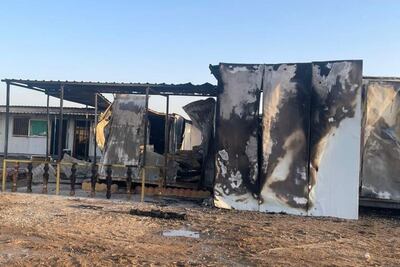One person, it is often said, can make a difference. More often than not, we hope, it happens in a positive way, but the darker side to this aphorism is that one person can also fuel division and rancour, even between entire countries.
The continuing fallout from the inciteful burning of copies of the Quran in Sweden and Denmark is a case in point. There is considerable and justifiable anger in Arab and Muslim communities at the reprehensible actions of a clutch of provocateurs who do not have to deal with the serious international repercussions of their stunts. Nothing can excuse the desecration of a holy book.
The consequences of burning holy books and national flags are not mere topics for debate or intellectual jousting – they have a tangible impact. Sweden’s embassy in Baghdad has been attacked, Germany’s defence minister has cancelled a visit to Iraq amid security fears, diplomatic relationships that take years to develop have been damaged and vital economic co-operation has been threatened. This is in addition to the strain such nihilistic behaviour has placed on community relations in Europe itself.

The significant dangers posed by hate speech and polarisation have been recognised at the international level. Last month, the UN Security Council unanimously adopted resolution 2686, which not only recognised how incitement could lead to conflict but called on countries to “publicly condemn violence, hate speech and extremism … and prevent the spread of intolerant ideology and incitement to hatred”.
It is vital that the agenda be reclaimed from fringe figures. Gratuitous insult is a serious matter but allowing extremists – who loathe engagement and dialogue – to use shock tactics to seize the narrative is only to fall into their trap.
The challenge for legislators in countries where such provocations are now routinely taking place is to avoid enabling incitement by mistakenly conflating it with freedom of expression. Police and other branches of law enforcement need better guidance on what is permissible in terms of preserving public order and maintaining community relations.
In some countries where demonstrations over the Quran burnings are taking place, anger has spilled over into unacceptable attacks. Recent reports from Iraqi police that protesters in Basra burned three caravans belonging to a demining project run by the Danish Refugee Council show how unchecked anger, whipped up far away, only damages the lives of vulnerable Iraqis, many of whom are already frustrated at living with years of social, economic and political challenges.
Such a state of affairs is in no one’s interest. Allowing a country’s foreign policy to be influenced by extremists who often lack any real support is questionable. There are many ways to effectively register disgust and upset at flagrant attacks on the religion and values of millions of people. But careful steps are needed if we are not to let provocateurs chalk up a victory in the process.


